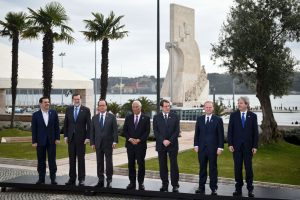A Mediterranean axis more solidarity in the EU?
Employment and Social Affairs 12 February 2017On 3rd of February German Chancellor Angela Merkel said in Malta that European leaders should commit to a EU based on “different speeds” when they will sign a Declaration on its future at the 60th anniversary of the Treaties of Rome in March. The proposal received wide appeal on international media but at the same time it is not a real innovation in the EU: the multi-speed Europe concept (called also “variable geometry Europe” or “Europe à la carte”) has been debated for years in European political circles as a way to solve some institutional issues; multi-speed Europe or two-speed Europe aims to salvage the widening and deepening of the European Union in the face of political opposition that could arise in some country. Furthermore this concept is already implemented, as widely known even by the fact that not each EU member state is also part of the Eurozone or of the Schengen Area. Thus the real issue should be how to concretely implement this “two speed” concept and adapt it to the new challenges EU is facing. And the real decisive question appear to be how to develop this concept in order to make it an instrument for more unity in the EU and not for bringing even more divisions in those difficult times. From this point of view the EU should be aware that there is a requirement for harmonizing the needs of its Mediterranean countries with those of the North. It is in the interest of the EU project’s future to acknowledge that dangerous split between countries like Italy, Greece and countries of the north of Europe, does exist. “It is right to ask for the respect of the rules on deficit and on public balance but on the other hand it should be equally valid that all EU countries have to share the burden of the migrant crisis”, this is the call coming from two “EU-Med” countries, Italy and Greece, as stressed by Italian and Greek president during their meeting in Athens on 17th of January. Italy and Greece share a common view of the EU and both countries believe that the EU should focus on economic growth and boosting employment, “in particular for young people,” the Italian president Sergio Mattarella said during the visit in Athens.
The occasion of 60 years from the signing of the Treaty of Rome next March is an opportunity to rekindle “the sense of solidarity”, which should govern the EU and its peoples. It appears to be not sustainable anymore an EU driven by interests and informal institutions, like Eurogroup, asking always for more austerity and reforms to weakest countries – as is the case now once more for Greece – without allowing a real relaunch of those states industrial production and investment, key elements to create also growth and job opportunities.
It is not by chance that it was Greece’s premier Alexis Tsipras that launched the idea for a Mediterranean countries of the EU informal forum. The Heads of State and Government of Portugal, Spain, France, Italy, Malta, Greece and Cyprus met again in Lisbon at the end of January to find common ground on European Unions’ policies, in particular, on economic growth, investment, and migration and co-operation with partner States of the Mediterranean and Africa. This was the second informal summit of Southern European Union countries – the first one took place in Athens, on the 9th of September of 2016 – and reaffirmed the confidence of the seven countries in the European project and the conviction that building a stronger and more cohesive European Union is a priority that corresponds to the national interest of each country. Only by bridging the growing gap existing between people expectations and EU actions then the European project could overcome the rising of populism that pose a challenge to the Union. Thus a two speed Europe should clearly aim at harmonizing the balance of power actually existing among EU countries, not being a means to escape from responsibilities that can’t be separated from Europe’s fundamental values. This issue could be assisted by the Maltese presidency of the Council of the EU, a little country of the Mediterranean Sea that could aim at reorienting Brussels priorities in this crucial area.

PATRICIA DE MELO MOREIRA/AFP/Getty Images)


